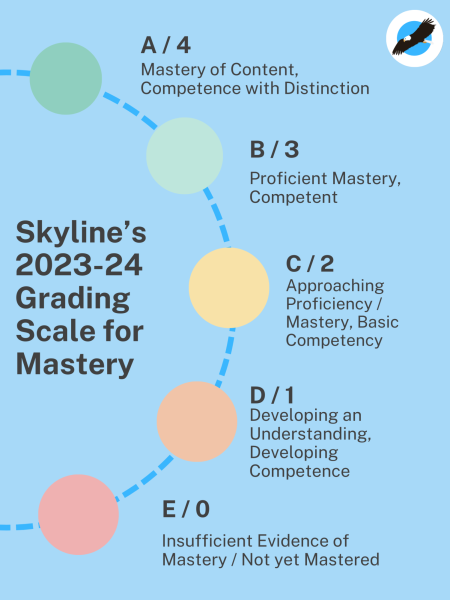This Fall, Skyline announced yet another new grading policy, the third grading policy change in as many years. This has caused mixed emotions among the Skyline community.

An especially controversial change was the decision to remove percentages for students in PowerSchool. “It’s really confusing which makes it stressful and I just don’t like it,” says Maddie Clarke (‘26). “The old way they did it made a lot more sense [to me] and to everyone I’ve talked to. I wish we had the old grading system back.”
Some new changes this year include:
- Required mastery assignments in order to pass a class
- Standardizing mastery retakes only up to 80%
- Hiding students’ percentages in PowerSchool
- “Incomplete” grade for missing mastery work
Why have percentages been eliminated in PowerSchool?
The drive to eliminate percentages came from the desire to scale down grading increments.
For a subjective assignment like an English paper, a traditional grading scale of 100 increments (100%) gives teachers 100 choices for a grade. One teacher may give an 85% and the other teacher an 88% on the exact same paper.
Instead, on a four-point scale, both teachers would agree the paper is a three. This new scale theoretically makes it more cut and dry. “Instead of 100 increments, we’re trying to get it down to [4 increments], with a plus or minus,” says Math Department Lead Jeff Oleksinski, who contributed to the decision-making process. “I don’t know how soon we’ll get there, but that’s …the drive for eliminating percentages.”
In the Skyline Administration’s ideal system, the teacher could have 12 choices of a grade (four letters with pluses and minuses, eg. B-, B+, B). Broader grading categories are intended to focus teachers on where a piece of work is in relation to standard. In theory, most teachers can agree a paper is at a certain level even if it would receive differing percentage grades.
The original plan was to switch to the four-point system, but as the staff was designing the new grading policy, they found that PowerSchool, the AAPS grading system, wasn’t entirely compatible with the grading changes that they envisioned.
These technological issues have forced students and staff to settle for a middle ground where PowerSchool no longer displays the grade percentage for students. The percentage is still calculated and exists, but only viewable by teachers.
“I don’t like the grading change. I feel like it affects mental health more than teachers realize because not being able to see your percent is kind of interfering with how you see your progress,” says Reyna Hyliard (‘24). “Recently, I moved from an A to an A-, but I don’t know how much I went down by, therefore I don’t know how much I need to do to bring my grade back to an A.”
Still, most teachers believe that the grading scale this year is better than last year’s. “It gives a more accurate reflection,” says science Teacher Tracy Mathewson.
Teachers encourage students who are still perplexed about their grades to talk to them. “It’s okay to be confused about your grades–it’s [a] brand new [change],” says Matthewson.
Why this change?
The Skyline staff has been reading Grading for Equity (2019) by Joe Feldman for the past few years. Some of the philosophies led the Skyline staff to take a critical look at the grading.
Few students were consulted in this decision.
“What we’re trying to do is to come up with a fair, equitable grading system that is up to date, not just the same old thing that we’ve been doing for literally hundreds of years,” says Skyline Counselor Dennis Brunzell. “Looking at it critically, asking some tough questions and then making changes — which is not easy. People have been used to that 100% system for years, it’s ingrained in our brains…. Change is good, it’s not always smooth, and it [doesn’t always] accomplish what it means to accomplish, but that’s what we’re trying to do. So, give us a little bit of grace.”
How will this affect student-athletes?
With the new policy, all mastery assignments are required to be turned in to pass a class, or else a temporary “Incomplete” or “I” grade appears in PowerSchool for the student’s overall grade until mastery has been demonstrated. Therefore, grade checks, a periodic review to check if student-athletes meet academic standards, are now a more dire scenario for some. Teachers believe that mastery assignments are extremely important to understanding the course material, so they decided to require completion of all mastery to pass a class.
The “I” grade is considered a failing 49% in PowerSchool. This has raised concerns since all student-athletes must be passing at least four classes (D+) come grade checks to maintain eligibility.
“I think it’s one of those things where taking that initiative and empowering athletes to make sure that they are getting things done [is important],” says School Psychologist Andrew Nalepa. “Part of the reason for grades is to motivate people to do well and get their work done. Part of that is … as a staff and teachers working with students to say, ‘okay, let’s plan ahead and make sure all your mastery assignments are done.’”
“Let’s use the resources to make sure that if you’re struggling with a mastery assignment [and] you need help, that you’re asking for help,” says Nalepa. Skyline offers a multitude of resources, designed to help students succeed including the Writing Center, SkySquad, ARC after-school tutoring, and the CUBE.
Is this long-term?
“I think there may be some tweaks, but I think the general bones of [the grading] is something that we’re committed to for the long term,” says Nalepa. “Ultimately, I think there’s going to be some growing pains and adjustments but in the long run […] students, parents and staff are going to appreciate the changes. I think it’s going to be better.”







